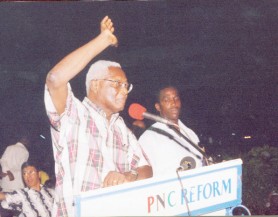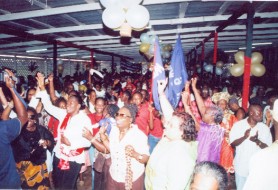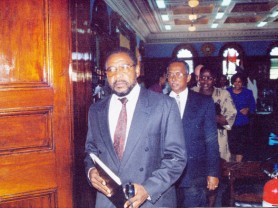Robert Corbin would have thought long and hard before his announcement in March that he would not be the People’s National Congress Reform’s presidential candidate at the 2011 general elections. For the time being at least, he remains Party Leader, a circumstance which suggests that he is seeking a dignified departure from the political centre stage. If his disclosure marks the unfolding of a pre-determined exit strategy for retirement into the PNCR’s elder statesmanship lounge, then his decision not to simultaneously demit office as Party Leader is understandable. Certainly, there are those who will argue that his long and unstinting service to the PNC from boyhood days has more than earned him the right to a less than sudden, inglorious exit.
The problem with that argument is that Corbin’s retention of the PNCR’s leadership now that he has made it known that he will not be the party’s presidential candidate in 2011 could have significant implications for the PNCR’s immediate future, given the party’s responsibility to name a presidential candidate ahead of general elections. From his vantage point as Party Leader Corbin might still be able to influence that nomination. That could lead to the Party’s presidential nominee going into the 2011 elections campaign in the shadow of the man who was himself denied a second ‘tilt’ at the presidency of the country on account of pressures from within his own political party. The other consideration of course is that the longer the issue of leadership succession remains on the front burner of the PNCR’s agenda, the less time the Party – and whoever is eventually named as its presidential candidate – will have to prepare to face the polls next year.

One of only a handful of Burnham’s old guard still remaining in active politics, Corbin, now 62, assumed the leadership of the PNC on February 1, 2003 following the death of Hugh Desmond Hoyte on December 22 of the previous year. His accession to office meant, among other things, a generational shift in the leadership of the PNC. Corbin, among others, had sat at the feet of Burnham as a member of the Young Socialist Movement (YSM) the PNC’s youth arm. Emerging as one of the Kabaka’s most trusted lieutenants, Corbin was rewarded with a succession of influential party and ministerial posts which pointed to the likelihood that he might one day lead the PNC and perhaps even accede to the presidency.
The death of Forbes Burnham in 1985, as much as the PNC’s loss of power in 1992, radically altered the playing field and by the time Corbin became the Comrade Leader – having completed law studies at the University of Guyana and the University of the West Indies – the PNC was no longer what it had been two decades earlier. Loss of political power had been attended by an erosion of the grass roots party which Corbin himself had helped Burnham build. As Party Leader, moreover, Corbin did not come remotely close to inheriting the sheer authority which Burnham had enjoyed or even the public recognition which the more austere Desmond Hoyte had managed to garner, much more as a long-standing and well-respected member of Burnham’s cabinet than as a party functionary.

If, during the earliest period of his tenure, his entitlement to the leadership was not openly challenged, Corbin was compelled to settle for the reality that he would be first among equals rather than a supreme leader in the Burnham mould. Quite simply, the Party which he now led included at least a handful of contemporaries who would have felt entitled to be treated as equals. The ‘threat’ of more robust debate at the level of the Party’s leadership and even the likelihood of a measure of leadership jousting within the PNCR loomed large with Corbin’s ascendancy to its leadership.
That, however, was not Corbin’s biggest challenge. Prior to his assumption to the office of Party Leader, the PNC had slid into a state of considerable decline and had come to resemble a political party that lacked the capability to pose a serious challenge to the ruling People’s Progressive Party which, by the time Corbin became Leader of the PNCR, had already been in power for just over a decade.
Had Corbin been able to rebuild the PNC machinery – an accomplishment, incidentally, which had also eluded Desmond Hoyte – into something resembling what he had helped Burnham build – that might have been sufficient to demonstrate to his would-be rivals that he was ‘the real deal.’ To state that he has been unable to arrest let alone reverse the decline during his seven years of leadership of the Party is to state the obvious. It is, however, important to state as well that a fractured PNC was one of Corbin’s inherited burdens, the disassembling of the countrywide structure of political groups and the commensurate political control built by Burnham having occurred rapidly in the years following the sudden death of the revered Founder Leader. That apart, Corbin inherited a new tier of party technocrats, many of whom had openly opposed Forbes Burnham’s rule – and one of whom was later to openly challenge Corbin’s authority as party leader. These had found common cause with Hoyte’s PNC, infusing in the party a ‘reform’ element with which Corbin was probably less than comfortable.
The steady weakening of the PNC as “the vanguard party” had become particularly obvious during the period leading to the 1992 general elections when a combination of altered global circumstances and high-profile ‘intervention’ in Guyana’s political process pointed unerringly in the direction of regime change. None of this was Corbin’s doing.
If Hoyte had tendered a statesmanlike acceptance of his defeat at the 1992 polls which saw the accession of Dr. Cheddi Jagan to office, he subsequently set his face irreconcilably against the presidency of Janet Jagan and the failure of both local and regional intervention to stem a rising tide of militant PNC opposition to Mrs. Jagan’s rule had set the country’s two major political forces on a path of confrontation. Hoyte’s rousing political rallies coupled with street demonstrations set a new political tone and if Hoyte himself never abandoned the parliamentary option it had become clear that sections of the Party’s leadership and its urban rank-and-file supporters were now looking much more to extra-parliamentary approaches to providing the PPP with effective political opposition.

Arguably, therefore, there were certain particular expectations of Corbin when he assumed the leadership of the PNC. Hoyte’s reform element was hoping that the return of a Burnhamite to the leadership of the Party would not see a rolling back of the changes that had occurred under Hoyte and their own marginalization within the party’s leadership. No one can contend with any persuasiveness that Corbin was anything but moderate in his approach to managing his authority as Party Leader, at least during the early period of his tenure. Overtly at least nothing seemed to change.
Perhaps, however, his real initial challenge lay not with the leadership of the party but with its rank-and-file, its ‘die hard’ supporters who had made it clear that they expected continuity to Hoyte’s robust extra-parliamentary political pursuits, including huge and, on occasion, violent street demonstrations. What was also expected of Corbin from the standpoint of the well – being of the PNC as a whole was that he would seek to rebuild the Party infrastructure, to reassemble the intricate web of party groups, community gatherings and bottom-house meetings that was, in essence, the real strength of the PNC.
Corbin choose not to alter the political tone that had been set by Hoyte whose death had followed an 11-month period of boycott of the National Assembly by the PNCR. Indeed, Hoyte’s death was followed by a statement from the PNCR that a return to the National Assembly had to be preceded by the implementation of the constitutional changes reached at the Vlissengen Dialogue between Corbin and President Jagdeo. Corbin, for the time being at least, was choosing to sustain what the Party faithful had come to regard as the effective extra parliamentary pressure that had been created by the PNC under Hoyte’s leadership.
Corbin, however, would have wanted to put his own imprimatur on the leadership of the PNCR and that he did at the August 27th Fourteenth Biennial Congress of the Party by delivering a speech that sought to advocate that the warring major political parties “close the pages of the past and work resolutely for a bright and glorious future to bequeath a rich legacy to our future generations.” Additionally, his address articulated the desirability of “a government that is as broad-based as possible and that is flexible enough to bring on board its platform, for the reform of governance, all ideas, all realistic proposals, all patriotic elements and all who are willing to work with us for a better Guyana.” This was Corbin the statesman, or, some have argued, Corbin the political strategist, seeking not only to put his personal stamp on the leadership of the PNCR but making a gambit for a share of political power for the party.
From those who felt that some accommodation with the PPP/C was the best that the PNCR could hope for in its circumstances, Corbin’s 2004 Congress address won considerable plaudits. From others, including some brooding members of the PNCR’s leadership and sections of its rank-and-file who had become hardened by lengthy periods of militant protest, what Corbin had to say at the Congress sounded like a polemical excursion into the kind of wishful thinking that would do no more than send signals to the ruling party that the PNCR had abandoned its pursuit of militant extra-parliamentary opposition.
Whether or not he was aware of it at the time, therefore, in striking a concessionary political tone at the August 2004 Party Congress Corbin was taking a calculated political risk, the hoped-for payoff being a genuine response from the ruling PPP/C that could at least lead to serious discourses on the issue of shared governance. He would at least have been able to tender that to his colleagues in the PNCR and to the Party’s rank-and-file as some kind of justification for the conciliatory tone that he had taken at the 2004 Party Congress. His gambit failed. The cold shoulder given his shared governance advocacy served to re-enforce the belief among party hardliners and hyped up supporters that militant opposition was the desired strategy for political ‘engagement’ with the ruling party.
At the level of the leadership of the PNCR the failure of the shared governance gambit would also have strengthened the hand of other key Party leaders who had by now begun to flex their muscles and in some cases to voice ill-concealed disapproval of his style of leadership. The formation of the Alliance for Change marked the culmination of what had come to be regarded as a challenge to Corbin’s leadership by Raphael Trotman, a Hoyte protégée.
In the period ahead there were other fallings-out between Corbin and other prominent PNCR leaders including two other long-standing Burnham adherents, Vincent Alexander and James McAllister. Nor did the PNCR Leader ever seem to win support of the Party’s youth arm, The Guyana Youth and Student Movement (GYSM). Indeed, it will be recalled that in the wake of the 2006 general elections he attracted a fair measure of public criticism from members of the youth movement for not naming one of their number as a parliamentarian. One member, Ulande Albert, even pointed out in a letter published in the October 10, 2006 issue of the Stabroek News that in denying the GYSM a seat in the National Assembly Corbin had departed from a practice that had been established under Burnham and from which he himself had benefitted. These intra-party spats, some of which were prosecuted in full public glare, did nothing to embellish Corbin’s image as a leader who could unite and rebuild the Party.
There are those who argue that in some respects Corbin has perhaps been judged unfairly. In this regard they point to the fact that while the PNCR’s defeat at the 2006 general elections is sometimes regarded as another Corbin failure, the Party’s defeat at the polls was widely expected anyway and would, in all likelihood, not have been averted, whichever presidential candidate had been put forward. Those who still contend that he is simply not electable as President of Guyana are yet to make – at least publicly – a persuasive case for a candidate who is electable.
There are those too who contend that too much was perhaps expected of Corbin’s leadership of the PNC. That, however, does not obviate the fact that he failed to deliver on all of the major expectations. Perhaps against expectations, Corbin evinced no preparedness to sustain the ‘mo fiah’ approach that had emerged under Hoyte, symbolized by a succession of street demonstrations. His seemingly more moderate posture, underpinned by his advocacy of shared governance gave rise to audible resentment, particularly among rank-and-file PNC supporters and some members of the party leadership without winning the perhaps hoped-for positive response from the ruling PPP/C. On the other hand, there are those who contend that his decision to step back from the confrontational environment which he inherited as Party Leader served to temper a potentially volatile all-out political confrontation that may well have spiralled into uncontrollable violence.
The fact of the matter is, however, that Corbin succeeded neither in securing universal acceptance as the unquestioned leader of the PNCR nor was he able to put the pieces of the broken party back together again. That aside, his leadership became increasingly questioned if not challenged, among some of his senior colleagues, the ultimate confrontation manifesting itself in an uncharacteristic public tussle for the leadership before his most recent re-election to the Party leadership. Corbin may have been returned as Leader but it was by no means a universally popular victory, the outcome marred by publicly expressed charges that the electoral process had been manipulated to ensure the eventual result.
The fact that pressures which Corbin had been facing did not go away with his re-election to the leadership of the PNCR marked the start of a fresh round of challenges for the Party and for Corbin himself. If, at least publicly, there appeared to be no open rebellion, other senior party functionaries became more open and more sustained in expressing their concerns about the crisis facing the Party, invariably placing the Leader at the centre of the crisis. Corbin himself never appeared disposed to publicly defending himself against the criticisms that were emanating from within his own Party nor did he seem able to devise any new strategies to lift the cloud of gloom that had long settled over the PNCR, its members and its supporters. Only human, he would also would also have been affected by what had by now become the widely expressed view that he was not ‘electable’ as President of Guyana.
In the final analysis Corbin’s announcement last month that he would not be the PNCR’s presidential candidate at the 2011 elections represents an acknowledgement of and bowing to pressures for him to relinquish the leadership. With general elections probably a matter of just over a year – or, perhaps less than a year – away, political watchers will be monitoring unfolding events with the party, particularly just how much longer Corbin will continue to occupy the post of Party Leader, given the fact that it is the new presidential candidate, whoever that may be, that will be the central political figure in the PNCR as the party slips into electioneering mode.





